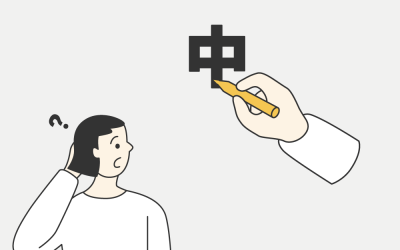Radicles function as a sort of base for Chinese characters and here we will look at 3 Chinese radicals that have to do with human body.
There is usually a hidden logic behind the formation of Chinese characters. When it comes to body parts, radicals often explicitly suggest which specific body part a certain word refers to. In this article, we would like to give you a general idea of the connection between some commonly-used radicals and different body parts.
1. The “Eye” Radical
“目”字旁 (“mù” zì páng) • “eye” Radical
The character “目” (mù) means “eye”. In ancient China, when people used pictogram to express their thoughts, the symbol standing for “eye” looked pretty similar to the modern Chinese character “目” (mù).
But in daily life, instead of “目” (mù), Chinese people use “眼睛” (yǎnjīng) for “eye”.
In general, characters containing “目” (mù) usually have to do with eyes.
EXAMPLES
- 眉毛 (méimáo) • eyebrows
- 看 (kàn) • to look
- 盯 (dīng) • to stare

2. “Mouth” Radical
“口”字旁 (“kǒu” zì páng) • “mouth” Radical
In terms of body parts, “口” (kǒu) can often be seen in characters that are related to one’s mouth. In fact, the word “mouth” in Chinese is “嘴” (zuǐ), which has “口” (kǒu) in it.
EXAMPLES
- 舌 (shé) • tongue
- 嘴 (zuǐ) • lips
- 喉咙 (hóulóng) • throat

3. The “Moon” Radical
“月”字旁 (“yuè” zì páng) • “moon” Radical
The character “月” (yuè) indeed means “moon”, however, it often serves as the radical in body-part-related words in that the “moon” radical also stands for “meat”.
EXAMPLES
- 胸 (xiōng) • chest
- 脖子 (bózi) • neck
- 腰 (yāo) • waist
- 手臂 (shǒubì) • arm
- 肘 (zhǒu) • elbow
- 肚子 (dùzi) • belly
- 背 (bèi) • back
- 腿 (tuǐ) • leg
- 脚 (jiǎo) • foot

Conclusion
Radicals are indispensable in linking related words into cohesive groups, fostering a systematic and efficient learning approach. Their ability to provide clues about a character’s meaning enables learners to deduce unfamiliar words accurately. By understanding radicals, learners can navigate through the vast landscape of Chinese characters with increased confidence and comprehension. Whether deciphering complex characters or grasping the essence of new vocabulary, radicals serve as foundational building blocks in mastering the Chinese language.
If you enjoyed this article on “Chinese Radicals About The Body” you may also enjoy the “Best Chinese Movies To Learn Mandarin“!









0 Comments